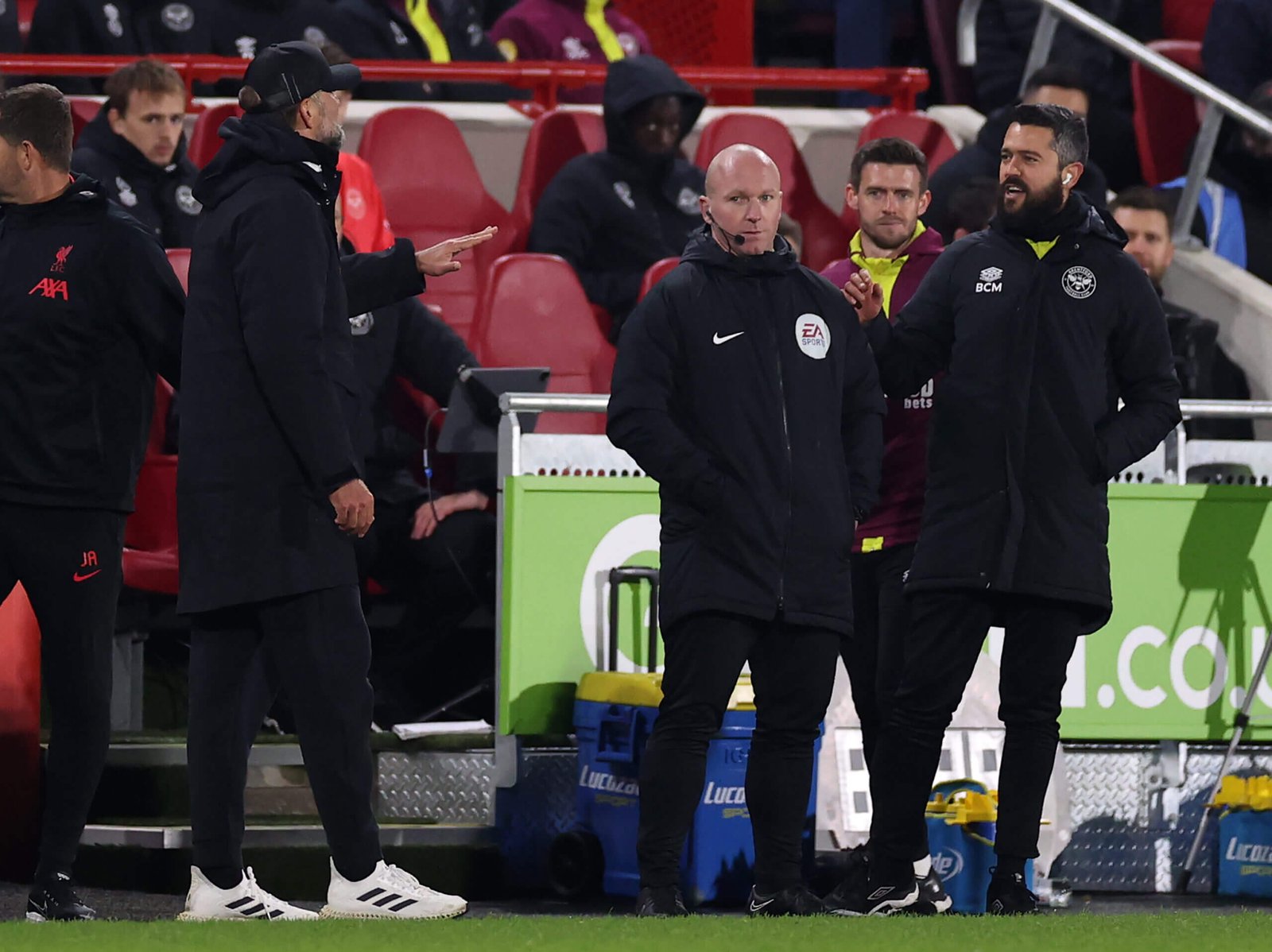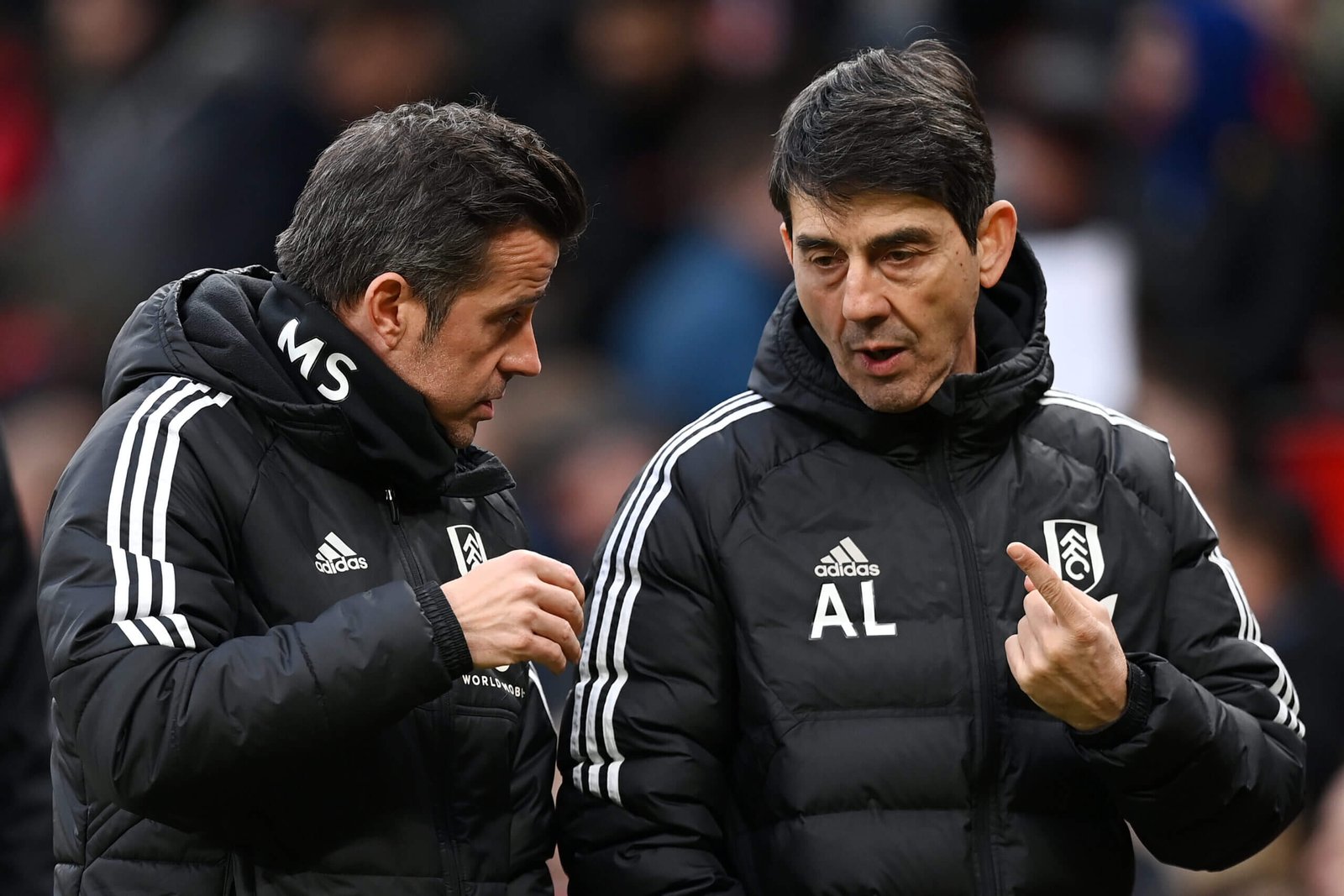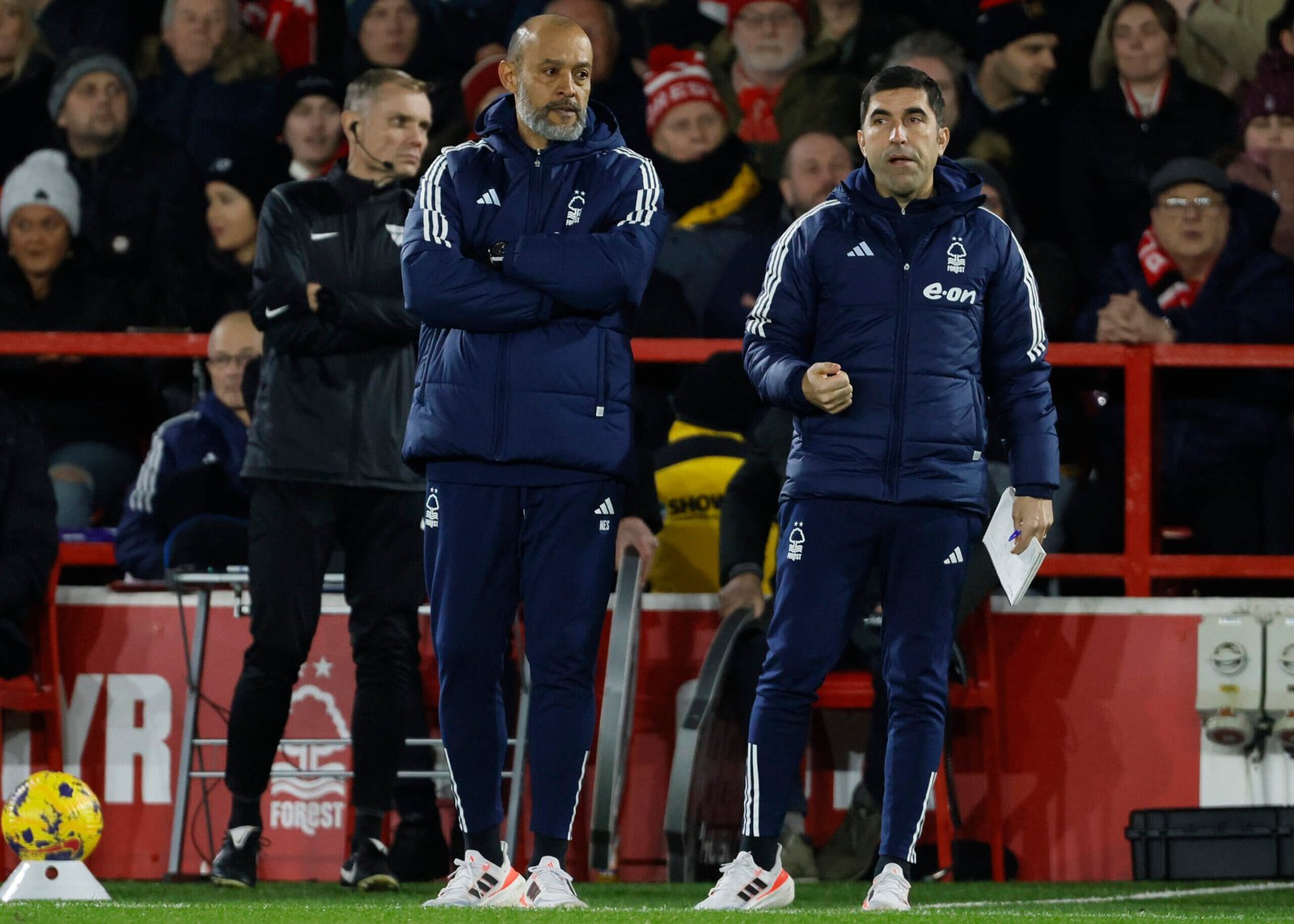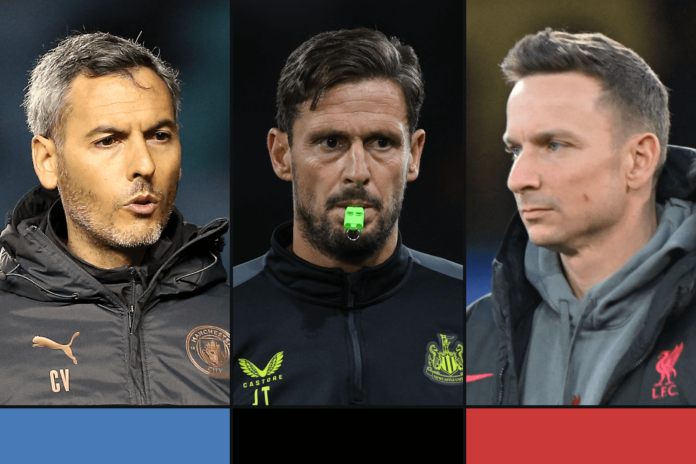You know the man all the cameras and microphones point at in the press conference, and what he brings to the table — but do you know the people he relies on?
Every manager is the public face of their club, but surrounding and supporting them is a backroom staff full to the brim with talented coaches, analysts, set-piece specialists, even chefs, who make his job possible. They even make teams tick — and could be just as important as the gaffer himself.
So, who is the person behind the most important man at your club? And why are they so crucial?
Here, The Athletic’s experts pick out the staff member at each Premier League club you should know about — and explain why.
Premier League viewers should feel a sense of familiarity whenever TV cameras pan over to Mikel Arteta and his staff on the touchline.
The most prominent face other than the manager’s is that of Albert Stuivenberg. Also known as ‘Airpod Albert’, he has been Arteta’s assistant manager since he was appointed in December 2019. A former coach for the Dutch national youth sides, Manchester United, Belgian club Genk and Wales, Stuivenberg’s tactical and technical knowledge and understanding are where he shines. His experience has also seen him take charge of Arsenal twice when Arteta has been unable to due to illness and suspension.
(Glyn Kirk/AFP via Getty Images)
Goalkeeper coach Inaki Cana also joined Arteta’s staff when he first got the job four years ago, and has been an influential figure in goalkeeping transfers Arsenal have made since then — most recently with David Raya, who he also played a role in taking to Brentford from Blackburn Rovers.
Next is set-piece coach Nicolas Jover. He joined Arteta’s staff ahead of the 2021-22 season and has had a major impact. That year, Arsenal did not concede a goal from a set piece until April. The Frenchman, who Arteta crossed paths with at Manchester City, can often be seen barking instructions at the edge of the technical area when Arsenal are both attacking and defending set pieces.
Miguel Molina and Carlos Cuesta, both hired in the summer of 2020, make up the rest of Arteta’s closest coaching unit and have benefited from more one-to-one conversations with players. Cuesta also began taking more of a lead in pre-match warm-ups after then assistant manager Steve Round’s departure last summer, while attacking-phase coach Hussein Isa also had more of a presence.
Art de Roché
Austin MacPhee is Unai Emery’s secret coaching weapon. He leads Villa’s vast catalogue of defensive and attacking set-play routines and is responsible, according to head coach Emery, for “80 per cent” of all dead-ball situations. To underline his importance, he has an assistant of his own to analyse upcoming opponents’ set plays.
Often, attacking routines are inventive and signal-led, with Matty Cash admitting last year that he struggles to remember them all. Whenever there is a corner or a free kick, MacPhee, with his long flowing locks, steps into the technical area and a sense of theatre ensues. He shouts and points furiously, shepherding players into the precise positions he wants them to be in.
McPhee was initially appointed in August 2021 to work under then manager Dean Smith and Emery has inherited the Scot from Steven Gerrard to great success — four months into the Spaniard’s tenure, 26 per cent of Villa’s goals had come through dead-ball situations.
Jacob Tanswell
In the case of Andoni Iraola, he was dealt a blow early in his Bournemouth reign last summer when it turned out his former assistant manager Inigo Perez would not be able to join him. Perez had limited coaching experience and no UEFA Pro Licence, which meant he wasn’t able to get a UK work permit.
Iraola has instead worked with Tommy Elphick and Shaun Cooper, who were already at Bournemouth, and Pablo de la Torre, who joined him from Spain. Elphick is a former captain of Bournemouth. He and Cooper both worked as coaches for the club’s academy before being promoted, staying with the club through a series of managerial changes.
De la Torre is slightly more fitness-focused, running warm-ups for training sessions and on matchdays. As a fellow Spaniard, he’s slightly closer to Iraola, but the head coach does rely on the entire group of assistants he works with.
Jon Mackenzie
Brentford
Brentford boast one of the best records for goals scored from set pieces in the Premier League, while their inventive approach to throw-ins generates a lot of chances too. These slick and sometimes wild schemes can be traced back to tactical statistician Bernardo Cueva.
Pay attention to him the next time Brentford win a free kick or a corner. Cueva springs from the bench to the edge of the technical area and makes signals to the players, usually Mathias Jensen, Bryan Mbeumo or Vitaly Janelt, about the best routine to use.
Cueva is from Mexico and he spent three years as an analyst for Chivas, one of his homeland’s leading clubs, helping them win the CONCACAF version of the Champions League in 2018, before joining Brentford ahead of the 2020-21 Championship season, in which they got promoted to the Premier League via the play-offs.
Claus Norgaard is head coach Thomas Frank’s primary assistant and plays a crucial role in organising their defence. When Brentford are defending a set piece, Norgaard will switch places with Cueva in the technical area and bark instructions at the players on where to position themselves and then to quickly push up the pitch when the danger is cleared.
Jay Harris

Cueva (right) (Ryan Pierse/Getty Images)
Roberto De Zerbi’s tactics are very much of his own making. He does not rely on one member of his backroom staff at Brighton — he leans heavily on them all in different ways.
Fellow Italian Andrea Maldera, his No 2, will be up in the technical area at Tottenham tomorrow (Saturday) as De Zerbi serves another touchline ban for three bookings, his third in a year.
Maldera is one member of a mix of coaching, conditioning and administrative staff that De Zerbi brought with him to the Amex Stadium in September 2022 after predecessor Graham Potter took five assistants along when he left to manage Chelsea.
Some of them, like Maldera, who was formerly the Ukraine national team’s head of match analysis, had not worked with De Zerbi before. Others, such as multilingual translator and general assistant Enrico Venturelli, had. They were together in Ukraine at De Zerbi’s previous club, Shakhtar Donetsk.
Ex-Brighton midfielder and under-21s coach Andrew Crofts provides continuity with Potter’s set-piece specialist Nick Stanley in De Zerbi’s heavily-populated backroom team.
Andy Naylor
It has been a steep learning curve for Vincent Kompany and his coaching staff this season as they have adjusted to Premier League realities after winning the Championship title in their debut year. Kompany is the main man who oversees everything but he is happy to delegate different areas of focus to his coaching team.
Assistant manager Craig Bellamy leads the attacking-phase coaching while first-team coach Mike Jackson looks after the defensive situations. During matches, Kompany will often be seen studying an iPad or in discussion with one of those two.
Bellamy deserves credit for some of the improvements made in Burnley’s attackers. Lyle Foster, in particular, has made significant strides following analysis sessions with the former Liverpool, Manchester City, Newcastle and Wales striker. Kompany and Bellamy share the same footballing ideas and principles.
In the summer, the Belgian added a second assistant manager, Piet Cremers, who was previously head of analysis at Manchester City, the club Kompany captained for many years. Performance manager and set piece coach Eliot Tybebo arrived too but has come in for criticism due to Burnley’s defensive set-piece struggles.
Andy Jones
Chelsea
When you hire Mauricio Pochettino, you really hire a coaching double act.
Jesus Perez is much more than your average assistant; in a multitude of ways he serves more as an extension of Pochettino himself, from organising training schedules and sessions to leading pre-match tactical presentations and having individual chats with players.
The public manifestation of that can be seen at every Chelsea press conference. Pochettino may be the man fielding the questions at the top table, but Perez always accompanies him into the room and sits in a designated chair just off-camera at the end of the front row, ready to assist with any troublesome translation issues.
Perez is highly regarded within football for his meticulous attention to detail, and his preference for positive reinforcement is generally popular with players. He is also extremely perceptive; not for nothing does Pochettino routinely describe him as “my eyes and ears”.
Liam Twomey
Given the uncertainty around Palace and their managerial situation, as well as their poor form, it wouldn’t make sense to pick any of Roy Hodgson’s present backroom staff. They are also struggling from both defensive and attacking set pieces.
Away from the coaching team, sporting director Dougie Freedman has a reputation for finding talented young players and having a good eye for a player, particularly ones in the Championship.
The arrival of Adam Wharton from that division’s Blackburn Rovers in the recent winter transfer window looks like another excellent signing for Palace and follows the squad overhaul of 2021 which included bringing in Marc Guehi, Michael Olise and Conor Gallagher (on loan), previously Eberechi Eze and more recently Cheick Doucoure.
Matt Woosnam
To the surprise of, well, nobody, Everton have become one of the most potent sides in the league from attacking set-pieces under Sean Dyche.
The former Burnley manager has long held a reputation for setting up his teams to excel from dead balls and has lived up to his billing so far this season. Only Arsenal (14) have scored more via this avenue than Everton (13), with the Merseyside outfit also boasting the highest expected goals total in the league from set pieces.
It has been a coaching team-effort. After another two set-piece goals on Saturday against Tottenham, Dyche chose to highlight the influence of club analysts and his coaching staff (assistant manager Ian Woan and coach Steve Stone) in helping implement a successful strategy.
“We want to be competitive on set pieces,” Dyche said. “The staff and analysts spend a lot of time (looking at) making the best chances we can. Some weeks, you spend more time on the opposition, but it is mostly what we do.”
Patrick Boyland
Marco Silva views his backroom staff as a team and does not like to suggest that one member is more important than any other. They are a close group. Luis Boa Morte, for example, has been friends with Silva since they were teenagers. They first met while playing for Cova da Piedade in the city of Almada, near Lisbon.
But when it comes to match analysis, Antonios Lemonakis is integral. The first-team performance analyst first worked with Silva at Greece’s Olympiacos, in 2015, and has remained by his side since then. “(Lemonakis) is important for me and my staff, he’s a key guy,” Silva said last season. “He knows what I want from the game.”
Lemonakis is valued for his in-depth tactical analysis, which he provides in-game via a link to the touchline from his analysts’ position, as well as pre- and post-match. He can be seen advising Silva at half-time as the players make their way back to the dressing rooms, and again at full time too.
He is thought to be influential regarding how the team adapts to different opponents, especially on set plays.
Peter Rutzler

Lemonakis (right) (Michael Regan/Getty Images)
Liverpool
Jurgen Klopp recently paid his assistant manager Pep Lijnders the ultimate tribute.
“The most influential guy in the last years, definitely, in this club was Pep,” he said. “The job he did is absolutely exceptional. The inspiration he is for me is absolutely exceptional.”
With the Klopp era coming to an end when the season concludes in May, Lijnders will also be moving on and the expertise of the highly-respected Dutch coach will be sorely missed.
He has given Liverpool nearly a decade of outstanding service. After initially arriving from Porto to be under-16s coach in 2014, he was promoted to the first-team staff by then manager Brendan Rodgers a year later to help guide the development of the club’s most gifted youngsters.
Retained by Klopp after his appointment that autumn, Lijnders had a brief spell away from Liverpool in January 2018 after taking over at NEC Nijmegen in his homeland. However, he was tempted back five months later after being offered the role of assistant manager by Klopp and has been responsible for planning and implementing the coaching programme since.
Lijnders has been crucial in the development of players such as Trent Alexander-Arnold and Curtis Jones. He’s the man Klopp turns to when the manager is considering making substititions on matchdays.
His knowledge and enthusiasm are unmatched and he’s an innovator — it was his idea to move Alexander-Arnold into the hybrid role that triggered the transformation in Liverpool’s fortunes towards the end of last season.
Richie Kyle was a PE teacher at Archbishop Beck Catholic College in Liverpool just over a decade ago. Now he is an assistant manager of a Premier League club.
Kyle, a former Liverpool Schoolboys coach, is Rob Edwards’ assistant, alongside Paul Trollope. It is a role he has performed twice before under Edwards, at Forest Green Rovers (which followed a short stint with Canada women’s national team) and later Watford. Edwards, who began his coaching career shadowing Kyle at Blackpool’s academy, has said he would not go into a job without his trusted No 2.
What makes Kyle integral is his positivity and how he communicates with players. The 39-year-old, who has been coaching since he was a teenager, is personable in his approach and makes it easy for players to understand and follow tactical instructions. What has been key to Luton is Kyle’s off-the-ball expertise. He led the Football Association’s out-of-possession programme as a specialist. It was working with England’s development teams where he reconnected with Edwards, who was, fittingly, an in-possession coach.
The pair bring a dynamic yet calming balance to Luton’s play. They are counter-pressing with high intensity that has seen them put four goals past Brighton and Newcastle in consecutive games. Kyle will be integral to these patterns of play and will also be helping make Luton’s set-piece routines tick. The team has scored 10 set-piece goals this season. Only Arsenal (14) and Everton (13) have more.
Kyle is having a serious impact on Luton’s increasing hardiness and flair.
Caoimhe O’Neill
Manchester City
When Burnley’s defence entirely misread the sublime Kevin De Bruyne free kick which sent Julian Alvarez through to score his second at the Etihad Stadium last week, Pep Guardiola immediately turned to his bench and sought out Carlos Vicens.
Vicens oversees City’s set-piece routines and — along with dead-ball analyst Jack Wilson — was every bit as responsible for that moment of magic as De Bruyne and Alvarez.
After a playing career spent in Spain’s lower leagues that was cut short by injury, Vicens’ public profile is modest enough that the TNT Sports cameras misidentified a different member of staff when trying to train their lens on him after Alvarez’s goal.
But the 40-year-old’s work has long been appreciated at the Etihad. A single season in charge of City Under-18s had brought league and Youth Cup titles before his promotion to the first team set-up in 2021.
Vicens took on responsibility for City’s set pieces and Guardiola’s side went on to score 22 goals and concede just once from such situations in the Premier League that year — their plus-21 goal difference being a record since that data began being collected.
That alerted Eredivisie side Heracles Almelo. Vicens initially agreed to join Heracles as their head coach in the summer of 2022, only to reverse his decision upon their relegation from the Dutch top flight at the end of the previous season. City — and not least Guardiola — are delighted to still have him on board.
Mark Critchley
Manchester United
When Cristiano Ronaldo launched his excoriating attack on all aspects of modern-day United, even the canteen at Carrington, their training complex, didn’t escape his ire.
But if Ronaldo had kept his powder dry and stuck around for a few weeks longer, he would have had the chance to sample the delights of United’s specially designated first-team in-house chef Omar Meziane.
Meziane started work shortly after Ronaldo’s departure, at the beginning of last year, joining from a position with the England cricket team. He had previously worked with England’s footballers too, and co-authored a book on nutrition with former England rugby-union player James Haskell.
Meziane and one of three sous-chefs travel to every United game — home and away — a day ahead of Erik ten Hag’s squad, to prepare meals. Menus are put together weeks in advance and tailored according to specific demands, while dishes at Carrington often incorporate foods from the players’ native countries.
Though not strictly a member of Ten Hag’s staff, chefs have an integral role in player well-being at Premier League clubs and Meziane’s food has not only made an impression among United’s players. Opposition teams visiting Carrington for behind-closed-doors friendlies this season have left the canteen raving about his offerings.
Mark Critchley
Newcastle United
“Secret” is not the word most would use to describe Jason Tindall, but Newcastle’s assistant head coach is far from a figure of fun, despite being universally hated by fans of rival clubs and being affectionately nicknamed “Mad Dog” by his own side’s supporters.
While Tindall and Eddie Howe may be opposites off the field — they do not even socialise together — they are very much a managerial double act, and have been since their League Two days with Bournemouth.
Howe refers to the duo as a “partnership” and Tindall is heavily involved in all aspects of the first team alongside the head coach. That is partly why Tindall is the most visible assistant manager in the Premier League — and why a rule change was effectively brought in to prevent him from standing alongside Howe in the technical area for the duration of matches, as they have done since they first started coaching together — but his touchline antics are not merely for show. Tindall, alongside Howe, provides messages about tactical tweaks and pressing, while he also leads set pieces.
It is Tindall, alongside Stephen Purches, the first-team coach, who is the mastermind behind offensive and defensive dead-ball situations. Rather than employ a specialist set-piece coach, the pair devise the routines, delivering nine goals from an expected goals (xG) figure of 8.64 from such scenarios so far in the 2023-24 Premier League.
Tindall insists, “I can only be me”, but scratch below the surface and he is so much more than an irritant on the touchline.
Chris Waugh
Rui Pedro Silva has been with Nuno Espirito Santo since day one of his coaching career. The trusted assistant joined Nuno as he started out at Rio Ave in their Portuguese homeland in 2012, then went with him to Valencia, Porto and Wolves.
And the man who knows Nuno as well as anyone, who understands what makes him tick, is back alongside him now at the City Ground.
At Wolves, Silva was generally the first one players would talk to if they had an issue they wanted to raise with the management team. The dynamic is still settling at Forest, with the group having only been in charge since December 20, when Nuno was appointed as the replacement for Steve Cooper.
Nuno has a close-knit staff around him; people he has grown to trust over a long period. He regards what he does as being a team effort, rather than something achieved by him alone. Fitness coach Antonio Dias has worked for Nuno at every one of his six previous clubs, also including Tottenham and Saudi Arabia’s Al Ittihad. The second of his assistant coaches, Julio Figueroa, was also with him at both Valencia and Wolves.
Paul Taylor

Rui Pedro Silva (right) with Nuno (Richard Sellers/Sportsphoto/Allstar via Getty Images)
Alan Knill remains very much Chris Wilder’s sounding board when it comes to tactics, the pair having worked together at a variety of clubs, alongside long-time ally Matt Prestridge, the first-team coach who specialises in sports science.
The two men first worked together at Bury, ironically when Knill was the manager and Wilder came in as his assistant after a chastening meltdown of Halifax Town that had seen the Conference club declared bankrupt. It was always going to be a short-term thing, Knill knowing full well his fellow former Southampton apprentice would return to management. This duly came to pass when Wilder took charge of Oxford United in December 2008.
Wilder was reunited with Knill a little over five years later at Northampton Town, this time in the manager-assistant setup that has since taken the pair to Sheffield United (twice), Middlesbrough and Watford. With Prestridge working hard to keep fitness levels up, that first spell at Bramall Lane saw United deploy the overlapping-centre-back set-up that for a time made the club the talk of football.
Wilder currently works alongside Knill, Prestridge and Keith Andrews at the Premier League’s bottom club.
Richard Sutcliffe
Tottenham Hotspur
All the Spurs coaches have different roles, and all are highly valued by head coach Ange Postecoglou. So picking one out isn’t easy.
But Chris Davies, the assistant head coach is the most senior, so let’s go with him. Especially as he has made a very positive impression since joining the club last summer. Previously Brendan Rodgers’ assistant at Swansea City, Liverpool, Celtic and Leicester City, Davies is very well-thought-of in the game.
As well as the very good training sessions he puts on, what has stood out since Davies came to Tottenham is his attention to detail. Nothing is left to chance with him — whether that’s opposition analysis or an upcoming session — and that’s how Postecoglou wants it.
It was little surprise that Swansea approached him to take their head coach job in December. His decision to stay looks very much like their loss and Spurs’ gain.
Charlie Eccleshare
Kevin Nolan, the first-team coach, is an important figure behind the scenes for manager David Moyes. He is the link between the players and the staff and Moyes’ trusted eyes for the development of players in the academy.
A former player for the club a decade ago, Nolan is the first member of the backroom staff to embrace players when they have been substituted. Nolan will also give instructions to those who are set to come off the bench.
Johnny Heitinga, Billy McKinlay, Xavi Valero, Mark Robson and Henry Newman are also other trusted members of Moyes’ coaching staff, but it is Nolan who remains the most valuable.
Roshane Thomas
Wolverhampton Wanderers
Wolves’ coaching team under Gary O’Neil is very much a collective, so picking out one figure as more important than the others is difficult.
Shaun Derry, a former team-mate of O’Neil’s at Queens Park Rangers, provides the experience of first-team management and the wisdom and kudos that comes with a long, successful playing career. Ian Burchnall offers the different perspectives gained from getting into coaching from a young age and managing clubs in Norway and Sweden.
Goalkeeping coach Neil Cutler is also a big voice. But the trio had never worked with O’Neil as a manager before, so the key relationship is that with Tim Jenkins, his No 2 and a man who worked with him in Liverpool’s academy and at Bournemouth last season so had a prior understanding of what he demands and needs from his lieutenants.
Steve Madeley
(Top photos: Getty Images)
Read the full article here


